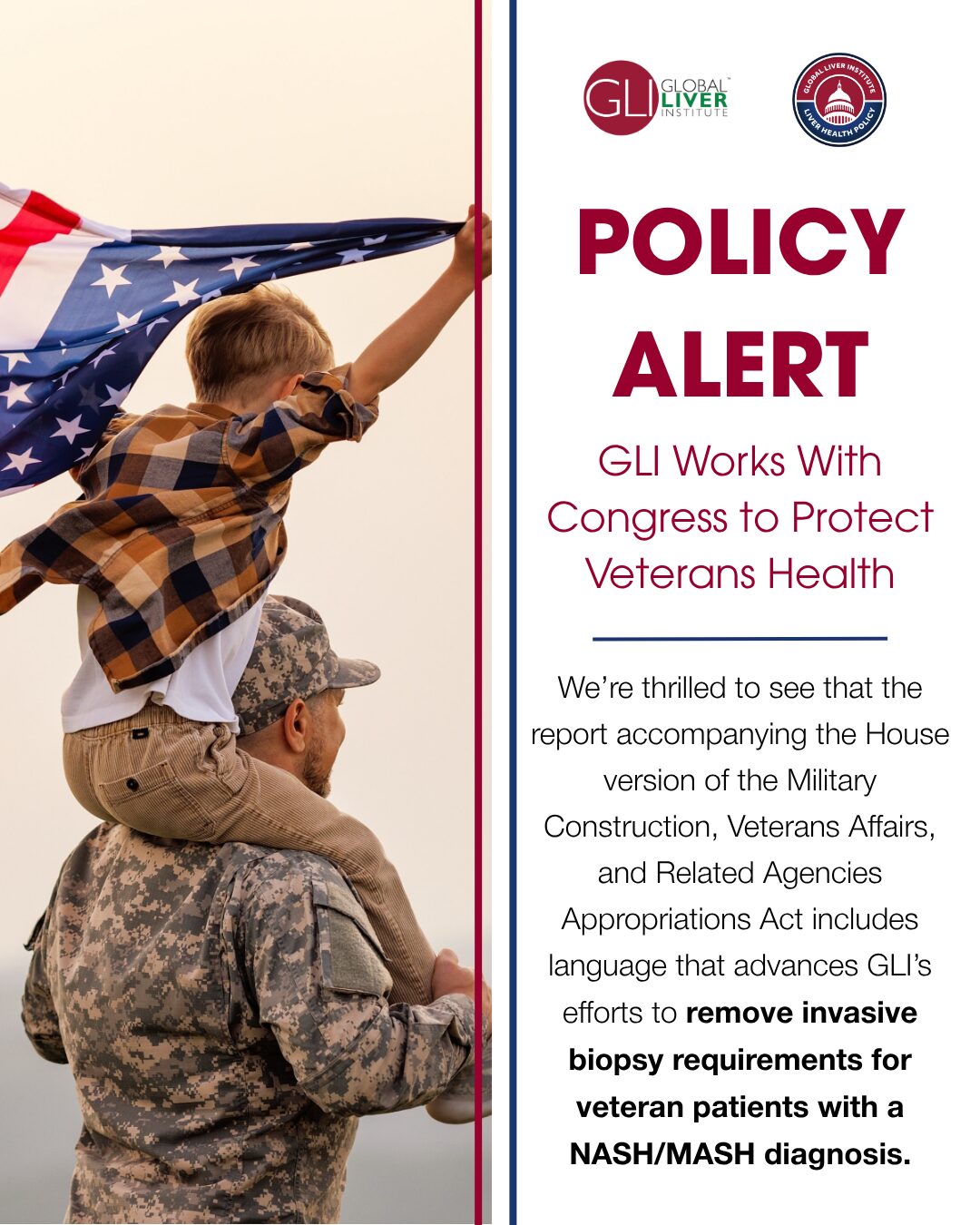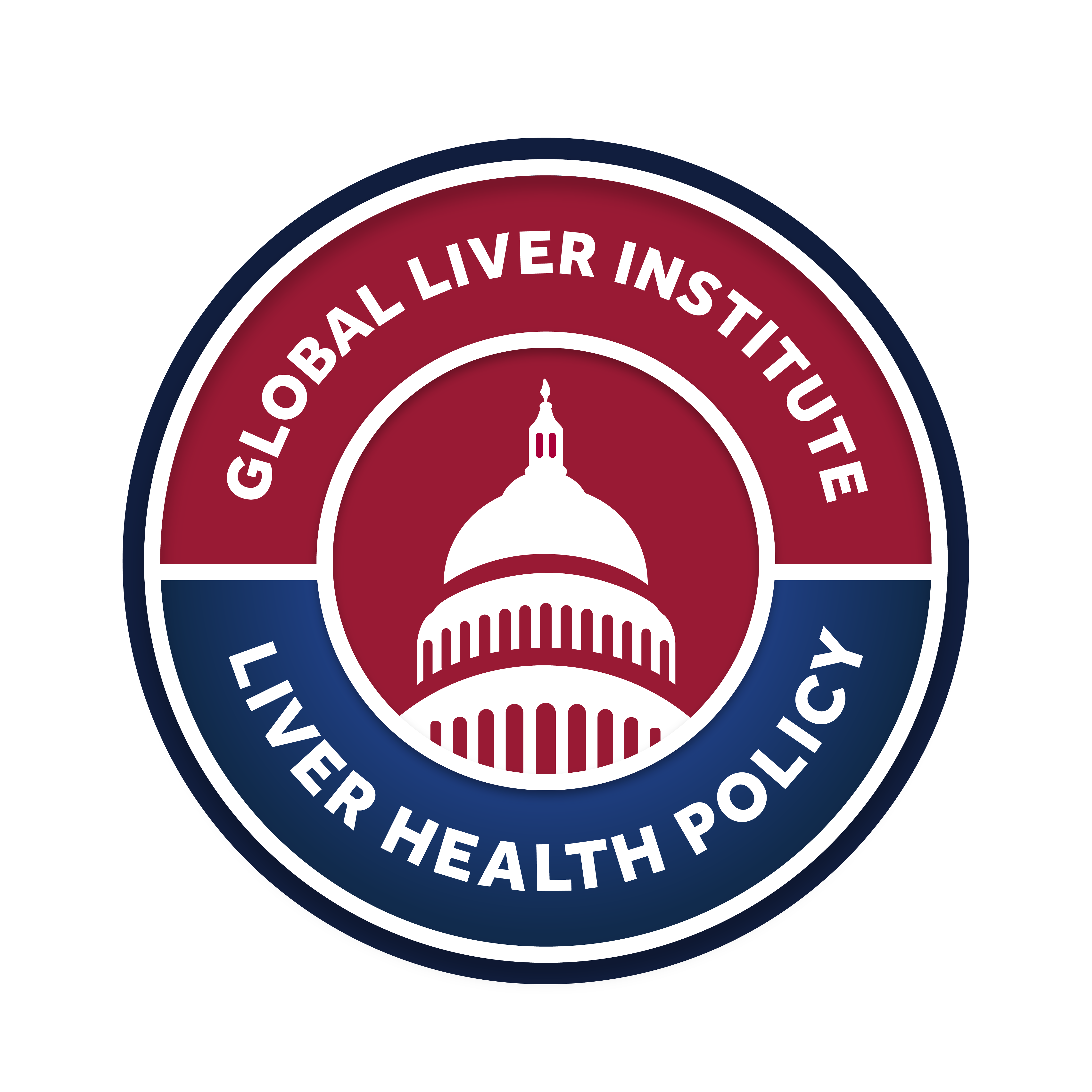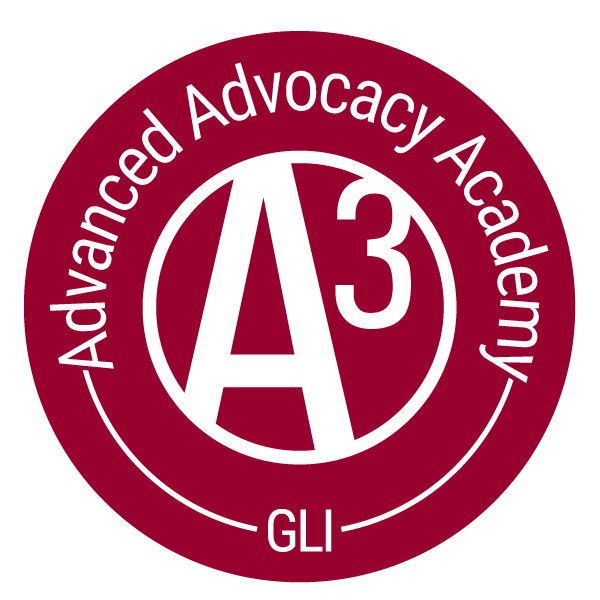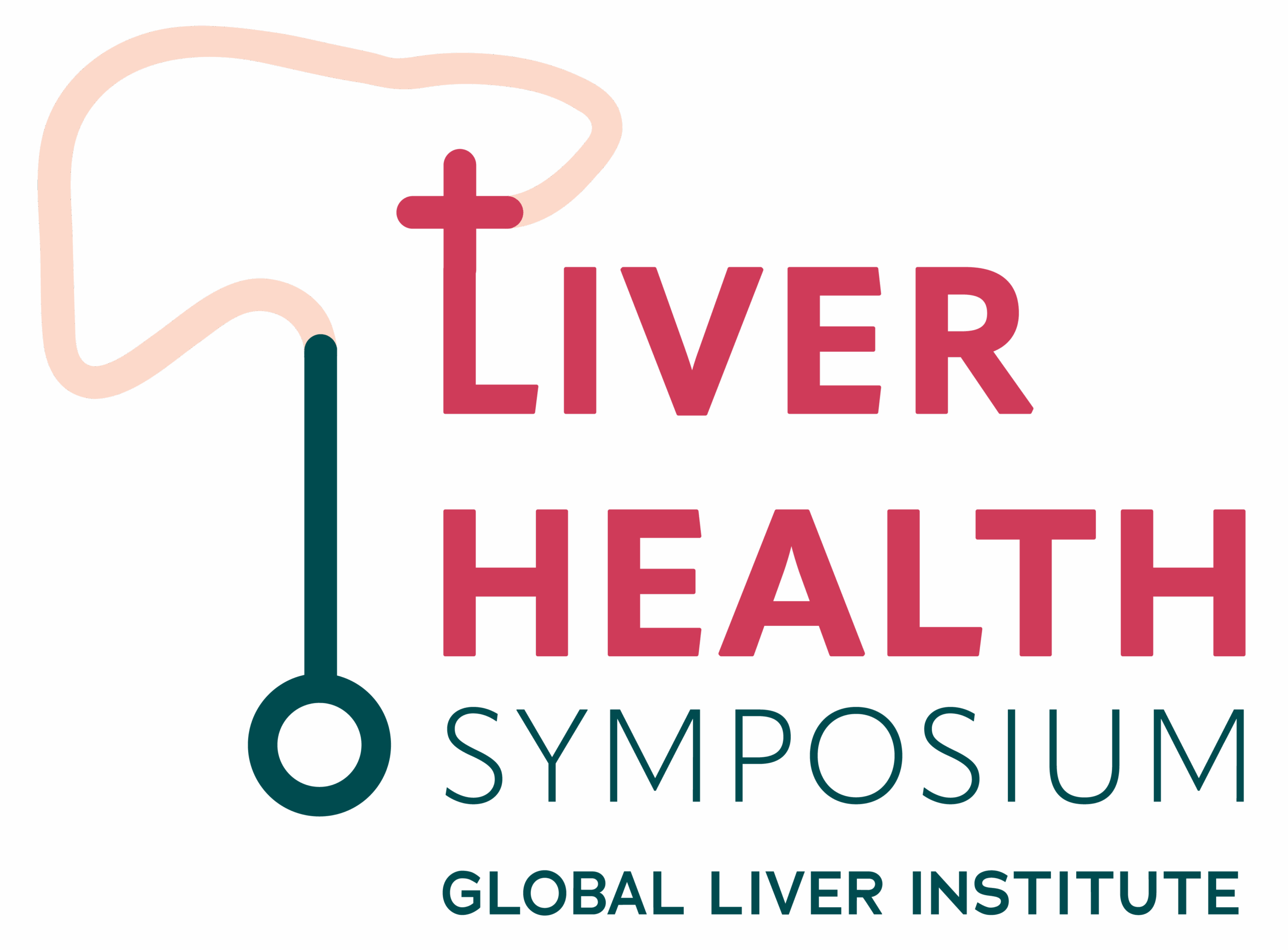GLI Works With Congress to Protect and Advance Veterans’ Health
GLI, in close coordination with congressional staff, has worked tirelessly to ensure that veterans diagnosed with NASH/MASH have no barriers to their care and treatment. GLI and patients with liver disease are very concerned about the Veterans Affairs (VA) biopsy requirement, which is contrary to the label from the Food and Drug Administration and clinical guidelines. After extensive advocacy work, we are thrilled to see that the reports accompanying the House version of the Military Construction, Veterans Affairs, and Related Agencies Appropriations Act and now the Senate version include language that advances GLI’s efforts to remove invasive biopsy requirements for veteran patients with a NASH/MASH diagnosis. We are extremely thankful to the members of Congress and staff who worked with us to make this happen. Check out the full statement here.
As part of GLI’s Beyond the Biopsy initiative, GLI and its partners sent a letter to the VA. GLI and AASLD also sent a follow-up letter to the VA calling for coverage consistent with clinical guidelines. Most recently, GLI sent letters to commercial payers whose policies restricted access to care based on flawed criteria, including Select Health of Utah, BCBS of Mississippi, Elevance Health (Anthem/CarelonRx), and Excellus BCBS.
We continue to encourage signatures here on a petition to all payers calling for coverage without biopsy for steatotic liver disease (SLD). GLI also urges advocates to contact their legislators to request the VA take steps to increase efforts to screen, diagnose, and treat veterans with MASH/NASH using non-invasive diagnostics and FDA-approved treatments, similar to Tricare, the Department of Defense’s (DoD) health program for active duty military members, their families, and retirees, and provide a briefing to the Committee on these efforts.
Congressional Appropriations Process Begins
Despite the White House’s preliminary fiscal year (FY) 2026 budget request outlining deep cuts to health and other non-defense discretionary programs, the Senate Appropriations Committee has advanced a bill funding the U.S. Department of Health and Human Services (known as the Labor/HHS bill) that is more generous than the President’s budget. Notably, funding levels for viral hepatitis at the CDC were not decreased in the Senate version. The Senate version also rejected proposed massive cuts to the NIH. GLI is encouraged that the report accompanying the Senate bill clearly articulates the importance of addressing liver-related challenges for health, such as:
- Deadliest cancers, liver (including cholangiocarcinoma);
- Vaccines for children, including hepatitis B;
- Biliary Tract Cancers;
- Liver Cancer;
- Co-infection of hepatitis B and HIV, with emphasis that liver disease is a leading cause of death for people living with HIV;
- Metabolic Dysfunction-Associated Steatotic Liver Disease [MASLD] Study;
- Vaccination and Screening for Hepatitis B;
- National Perinatal Hepatitis B Prevention Program, emphasizing preventing chronic liver disease and liver cancer;
- Strategic Plan for Trans-NIH Research to Cure Hepatitis B;
- Development of point-of-care tests for HBV, HDV, and the cancers caused by these viruses;
- Obesity as a disease, requiring comprehensive treatment.
GLI will closely follow the House process when Congress reconvenes in September.
GLI is Deeply Concerned About Patient Access to Care, Particularly in Rural Hospitals
The reconciliation bill, H.R.1, included deep Medicaid cuts that are expected to reduce federal funding for rural areas by about $137 billion. These cuts will look different from state to state (KFF analysis), but the overall impact will likely include fewer people with health insurance coverage and severe financial strain on rural hospitals that already operate on thin margins. As rural hospitals make up at least a third of all hospitals in most states, this impact will be widespread. When these hospitals lose funding but are still expected to treat patients — especially those without insurance — they may be forced to lay off staff, cut services, delay facility upgrades, or, in some cases, shut down entirely.
To help offset these impacts, lawmakers created a $50 billion Rural Health Fund — a fraction of what rural areas are projected to lose. Only half the fund will be distributed across states with approved applications, and the rest will be awarded through an undetermined process. Notably, in conversations with stakeholders, CMS Administrator, Dr. Oz, has indicated that the Rural Health Fund should be used to make long-term investments in technologies to improve efficiency and address issues with cybersecurity, rather than being used to stopgap funding cuts. Adding to the challenge, the fund is temporary, while many of the Medicaid cuts are permanent.
Another source of concern is the possible expiration of the Medicare-Dependent Hospital (MDH) program, through which Medicare provides additional payments to small rural hospitals that treat a high share of Medicare patients. These payments are set to end on September 30, 2025, unless Congress acts. Last week, CMS warned that if the program is not extended, rural hospitals could lose an additional $500 million in 2026 alone. More than half of MDH-designated hospitals already had negative margins in 2023, and losing this support could push many over the edge.
GLI is very concerned that the combined effects of the Medicaid cuts, the uncertain rollout of the Rural Health Fund, and the looming expiration of the MDH program could be devastating for rural hospitals and for the patients they serve. Patients may find it harder to access care close to home, with fewer services, longer travel times, or even no local hospital at all. If Congress also allows enhanced premium tax credits (which help people buy insurance coverage on the marketplace) to expire, even more people could lose coverage, compounding the financial strain on these already vulnerable providers. Therefore, GLI will advocate for Congress and the administration to do everything in their power to address the challenges facing rural hospitals and the patients they serve.
U.S. HHS Pulls $500M in Funding for Vaccine Development
On August 5, the U.S. Department of Health and Human Services announced it would cancel contracts and pull funding for 22 projects investigating mRNA vaccines to fight respiratory viruses. This follows several decisions from the department and Secretary Robert F. Kennedy, Jr. that have undermined trust in vaccines – a key tool in the prevention of viral hepatitis B and D and liver cancer. GLI will continue to monitor the situation and advocate for lifesaving and essential immunizations to protect liver health and especially for our patients who are often immunocompromised.
Senators Cassidy and Van Hollen Introduce the Cure Hepatitis C Act
GLI proudly supports legislation (S.1941) introduced by Senators Bill Cassidy (R-LA) and Chris Van Hollen (D-MD) aiming to implement a nationwide elimination program for the hepatitis C virus (HCV) in the United States. The bipartisan bill prioritizes patient health and safety, advances a national plan to eliminate hepatitis C, and seizes an opportunity to end a global health crisis through screening, diagnosis, and treatment. Since curative treatments became available over a decade ago, GLI has advocated for a national strategy to eliminate this now-treatable infectious disease. We look forward to working closely with Congress and the current administration to get it over the finish line.
GLI’s statement can be found here. View AASLD’s action alert to help gather additional Senate co-sponsors.
The House and Senate Reintroduce TROA, Administration Reported to Be Considering a Plan for Coverage
GLI applauds the reintroduction of the bipartisan Treat and Reduce Obesity Act (S.1973/H.R.4231), most recently reintroduced in the House with 12 original sponsors (15 total) on the heels of Senate reintroduction by Senators Bill Cassidy (R-LA) and Ben Ray Luján (D-NM). Within both the political and scientific realms, there is growing recognition of obesity as a chronic disease and the need to address and treat obesity like any other chronic disease. A robust body of research demonstrates the connection between obesity and serious liver diseases, such as metabolic dysfunction-associated steatohepatitis (MASH), formerly known as nonalcoholic steatohepatitis (NASH), making access to treatment a top priority for GLI and patients. This bipartisan legislation would expand coverage of new health care specialists and chronic weight management medications for Medicare recipients. It will also work to mitigate the obesity epidemic by providing regular screenings. GLI’s most recent statement can be found here.
Additionally, the Washington Post recently reported that the administration is working on “an experiment to cover weight loss drugs under Medicare and Medicaid, potentially benefiting millions of Americans struggling with obesity.” GLI will continue to advocate for the administration to take steps to advance coverage of comprehensive obesity care, including medication. The supportive response to the Washington Post article from the Obesity Care Action Network, of which GLI is a member, can be found here.
Senate Help Discusses PBMs In The Context Of Health Care Affordability
On July 31, the Senate Health, Education, Labor, and Pensions (HELP) Committee held a hearing (TRP summary) entitled “Making Health Care Affordable: Solutions to Lower Costs and Empower Patients.” Members questioned the role of pharmacy benefit managers (PBM) in increasing health care costs, stirring bipartisan support for increasing transparency throughout the health care system. Additionally, the discussion highlighted the multifaceted nature of the nation’s health care system, and Members stressed the need to analyze all actors when considering reform efforts.
Policy Lessons from The Lancet Commission on Liver Cancer
The Lancet recently released a comprehensive commission on hepatocellular carcinoma (HCC), the most common form of liver cancer, highlighting that more than 60% of cases of liver cancer are preventable and that annual new cases are expected to double between 2022 to 2050. The Commission recommended that a sustained reduction of age-standardized incidence rate of 2-5% could prevent this trajectory. The report emphasized the role of policy and legislative changes to reduce the burden of liver cancer that align with GLI’s ongoing priorities:
- Access to liver cancer screening
- Focus on prevention, including vaccination for viral hepatitis and policy measures that reduce consumption of alcohol and unhealthy foods
- Investment in awareness campaigns about liver health
Read more from The New York Times (gift link).
Additional Bills Benefiting Liver Patients
GLI is closely monitoring the reintroduction of legislation that helps patients access and afford the health care they need. We will continue to update this list. A few bills reintroduced so far include:
- Living Donor Protection Act (S.1552/H.R. 4583)
- Ensures living donors do not face discrimination from insurance companies, codifies Department of Labor (DOL) guidance that covers living donors under the Family Medical Leave Act (FMLA) in the private and civil service, removes barriers to organ donation, etc.
- Accelerating Kids’ Access to Care Act (S. 742/H.R.1509)
- Improves children’s access to needed out-of-state health care by streamlining the Medicaid provider screening and enrollment process.
- Medicare Multi-Cancer Early Detection and Screening Act (H.R.842/S.339)
- Allows Medicare to cover simple blood tests to screen patients for cancer, leading to early diagnosis and treatment.
- HELP Copays Act (S.864)
- Requires health care insurers and pharmacy benefit managers (PBMs) to count payments they receive on a patient’s behalf, including payments from nonprofit organizations or drug manufacturers, toward the patient’s annual deductibles and out-of-pocket limit.
- Seniors’ Access to Critical Medications Act (H.R.2484)
- Allows Medicare patients to receive essential medications by mail or have caregivers and family members pick them up on their behalf. Reported favorably out of committee on April 29 in the House Energy and Commerce Committee.
- Pharmacy Benefit Manager (PBM) Transparency Act (S.526)
- Bans deceptive and unfair pricing schemes, prohibits arbitrary clawbacks of payments made to pharmacies and requires PBMs to report to the FTC on how much money they make through spread pricing and pharmacy fees.
- Capping Prescription Costs Act (S.529)
- Charlotte Woodward Organ Transplant Discrimination Prevention Act (H.R.1520/S.1782)
- Passed the House. Take action to support Senate passage here!
Upcoming Events:
- Friday, September 5 – Monday, September 8: Advanced Advocacy Academy, Washington, D.C.
- Saturday, September 20: GLI’s Liver Health Symposium, Minneapolis, MN, UA
- This CME program is dedicated to empowering community members, patients, caregivers, healthcare providers, and advocates with the knowledge and resources needed to improve liver health outcomes. Register





